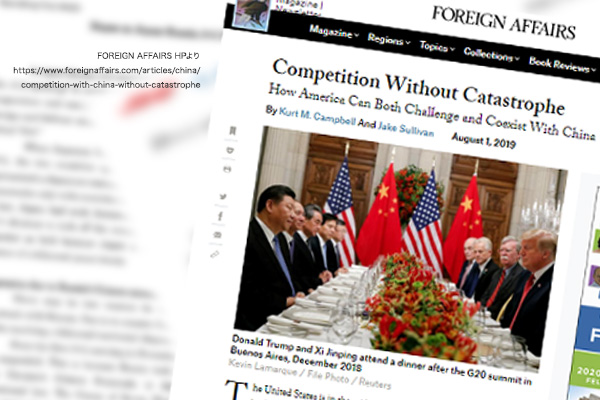Two former senior U.S. government officials, who are likely to lead a foreign policy and national security team if the Democratic Party wins back the White House in the 2020 presidential election, have contributed a joint article to the September/October issue of the U.S. foreign policy magazine Foreign Affairs, calling for “coexistence” with China. This apparently indicates that a political group loath to confront with China has begun to backlash against a hardline policy towards China firmly maintained by the Trump administration and bipartisan members of the Congress.
Former senior U.S. officials seeking to collaborate with China
The co-authors of the article are Kurt Campbell, who served as Assistant Secretary of State for East Asian and Pacific Affairs under then Secretary of State Hillary Clinton in the Obama administration, and Jake Sullivan, who was National Security Adviser to then Vice President Joe Biden. Their article echoes an open letter titled “China is not an enemy” published a month ago on The Washington Post by 100 mostly Democratic former government officials and scholars.
Of the two co-authors, Campbell who had expressed his expectation in the past that engagement with China might lead to its political reform published an article last year admitting that the wishful thinking was wrong, indicating his switch to a tougher stance towards China. Nevertheless, Campbell apparently has gotten back to an accommodative position to China, claiming in the joint article, “Despite the many divides between the two countries, each will need to be prepared to live with the other as a major power.”
“Coexistence” sounds good. However, China is a country that officially aims to win the world’s top comprehensive national power and international influence by the middle of this century, as vowed by its President Xi Jinping. China “will continue to pursue a military modernization program that seeks Indo-Pacific regional hegemony in the near term and displacement of the United States to achieve global preeminence in the future,” says the 2018 U.S. National Defense Strategy.
How could the U.S. coexist with a country seeking Indo-Pacific regional hegemony? “The United States will remain a resident power in the region, with a major military presence […] and a network of alliances and partnerships,” say Campbell and Sullivan. They also emphasize the U.S. would reject “ceding the world’s most dynamic region to China.” However, this could fail to be compatible with China’s strategy to push the U.S. out of the Indo-Pacific and establish its complete regional dominance.
Lacking measures to block Chinese hegemony
Assuming that “strategic competition” with China would force its capitulation or collapse, as the Cold War brought about the collapse of the Soviet Union, would risk making a mistake similar to that of engagement policy based on wishful thinking, Campbell and Sullivan note in an effort to justify the coexistence strategy.
However, it may be more important to discuss how to block China’s regional hegemony than to develop a U.S. strategy based on an assumption that China would never capitulate. The article fails to clarify measures to have China abandon its ambition of regional control as a precondition for the U.S.-China coexistence.
Yasushi Tomiyama is a senior research fellow and Planning Committee member at the Japan Institute for National Fundamentals and a former foreign news editor and bureau chief at Washington, D.C., London and Bangkok for the Jiji Press.


